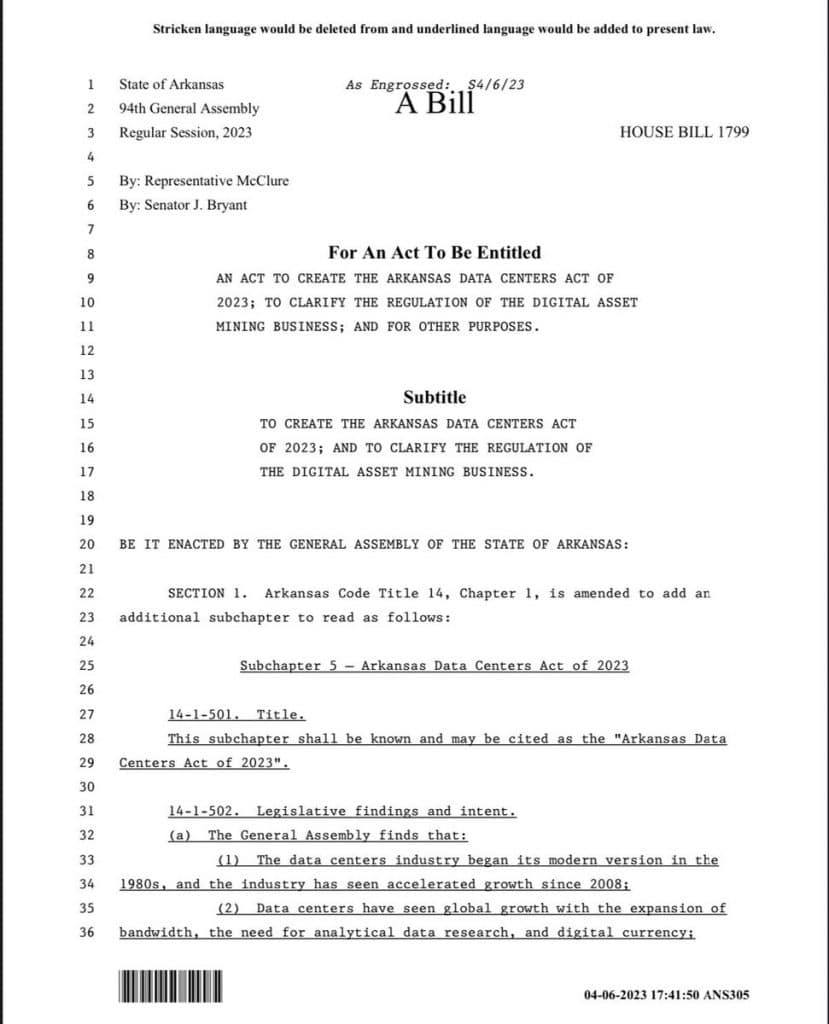
Arkansas presenterar ett lagförslag för att skydda Bitcoin Mining
- Lagförslaget syftar till att skydda bitcoin-gruvarbetare och ge klarhet i regleringen av digitala tillgångar.
- Arkansas är fokuserat på att skydda gruvarbetare från diskriminerande priser som erbjuds av energibolag.
Arkansas State House har godkänt en räkningen att kontrollera statens Bitcoin-gruvindustri. Lagförslaget, som redan har godkänts av delstatssenaten, kommer nu att vänta på att godkännas av guvernören. Arkansas Data Centers Act från 2023 syftar till att stoppa oetiska affärsaktiviteter genom att fastställa regler för bitcoin-gruvarbetare.
Lagförslaget föreslår att ett Bitcoin-gruvföretag kan verka i Arkansas om det följer alla tillämpliga statliga lagar, inklusive de som styr affärsföreskrifter och skattelagar, drift- och säkerhetsföreskrifter, regler för allmännyttiga tjänster och priser som fastställs av eller på uppdrag av offentliga enheter, och arbetslagar på både statlig och federal nivå.
Lagen föreslår också att gruvarbetare ska vara skyldiga att bedriva verksamhet på ett sätt som inte belastar ett elverks produktionskapacitet eller överföringsnät och att betala alla nödvändiga skatter och statliga avgifter i godkända former av valuta. Dessutom tillåter åtgärden individer att driva hem Bitcoin-gruvdrift i enlighet med lämpliga verktygsregler och avgifter.
Syftet med lagförslaget är att erkänna att datacenter gynnar lokalsamhällen och staten ekonomiskt genom att generera jobb, betala skatter och andra tjänster. Den definierar de regler som krävs för att skydda Bitcoin-gruvarbetare från orättvisa branschspecifika skatter och restriktioner.

Den föreslagna lagstiftningen definierar olika viktiga terminologier, inklusive "digital tillgång", som hänvisar till Bitcoin och andra kryptovalutor. Dessutom definierar den "digital asset miner" som en person som jagar efter digitala tillgångar och "digital asset mining" som processen att köra en dator på el för att säkra eller validera ett blockchain-nätverk.
I propositionen beskrivs en "nod" som ett datorsystem som innehåller blockchain-distribuerad ledger-teknologi. Termen "bostad" används i lagförslaget för att hänvisa till ett permanent hem, lägenhet, etc. Intressant nog godkändes Arkansas "Right to Mine" lagförslag av Missouri tidigare denna månad med en rungande 12-0 röst.
Dessutom undertecknade Montana ett liknande skydd mot Bitcoin-brytning tidigare i år. Texas passerade också en liknande. Dessa lagstiftningsåtgärder är utan tvekan ett bra drag med tanke på det osäkra regelverket i USA.







